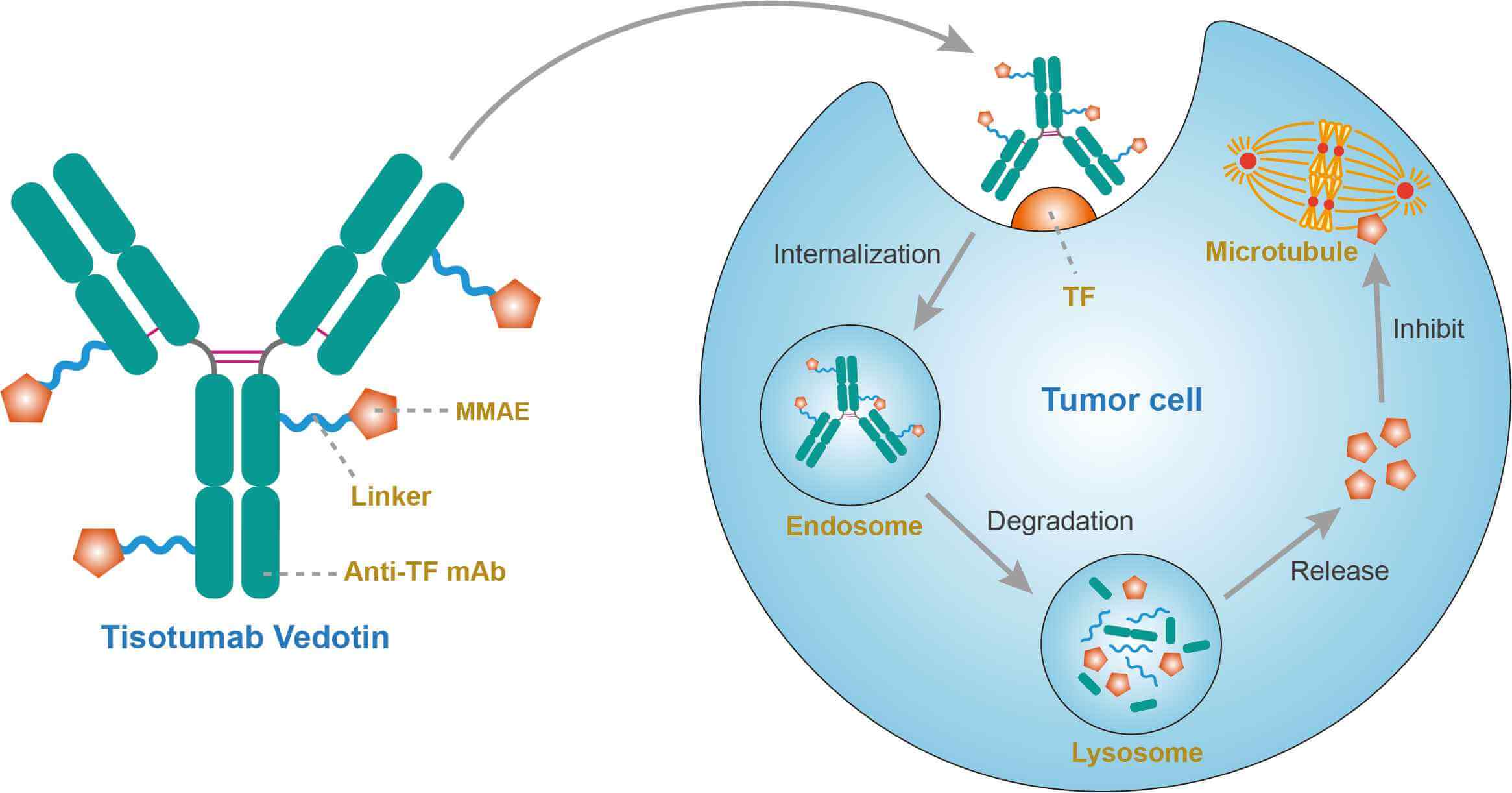

Tisotumab Vedotin Overview
Introduction of Tisotumab Vedotin
Tisotumab vedotin, also known as HuMax-TF, HuMax®-TF-ADC or TF-011-MMAE, is an antibody-drug conjugate (ADC) targeted to tissue factor (TF), a protein involved in tumor signaling and angiogenesis. Tisotumab vedotin includes an antibody targeting TF conjugated with monomethyl auristatin E (MMAE) via a cleavable maleimidocaproyl-valyl-citrullinyl-p-aminobenzyloxycarbonyl (mc-val-cit-PABC) type linker. Based on its high expression on many solid tumors (including ovarian, prostate, bladder, esophageal, endometrial and lung) and its rapid internalization, TF is considered a suitable target for antibody-drug conjugates. In pre-clinical trials tisotumab vedotin has shown strong ability to bind to TF and inhibit tumor growth. Genmab and Seattle Genetics are jointly developing tisotumab vedotin. In a Phase IIa study, preliminary data demonstrated a manageable safety profile and encouraging efficacy (ORR 37%) in relapsed, recurrent or metastatic cervical cancer.
Mechanism of Action of Tisotumab Vedotin
Tissue factor (TF) is an evolutionary highly conserved glycoprotein expressed in humans and several other species. Human TF is genetically coded by the TF gene coagulation factor III, tissue factor (F3) and transcribed to TF premature-messenger RNA (pre-mRNA). Because of alternative splicing, TF is expressed in 3 mRNA splice variants: full-length (fl)TF, alternatively spliced (as)TF, and a third variant named TF-A. Translation of flTF and asTF mRNA splice variants leads to the generation of the flTF isoform, a membrane-bound and highly procoagulant protein, and soluble asTF with low prothrombogenic potential but strong proangiogenic, cell proliferation-facilitating, and prosurvival activities. The TF-A mRNA splice variant is not translated to a protein because of termination sequences within alternative exon 1A, leading to an early translation stop. TF-A mRNA expression has been detected in several cancer cell lines as well as in human endothelial cells. However, the biological function of TF-A is still unknown. flTF and asTF are expressed in several types of cancer cells and tumors and play important roles in cancer biology, i.e., in thrombogenicity, survival, tumor growth, angiogenesis, signaling, invasion, and metastasis. Moreover, both TF isoforms are also involved in other pathologies, such as cardiovascular diseases. Therefore, tisotumab vedotin targeting specific TF isoforms offers novel potential therapeutic options for the treatment of cancer patients. In addition to targeting and blocking TF, tisotumab vedotin shows its typical ADC mechanisms. It binds to TF, leading the Internalization and then intracellular trafficking to the lysosomes. After that, tisotumab vedotin is enzymatically degraded, resulting in the intracellular release of MMAE, which induces cell death by microtubule disruption. In addition, release of MMAE in tumor microenvironment induces bystander, killing of neighboring cancer cells.
 Fig.1 Mechanism of action of tisotumab vedotin
Fig.1 Mechanism of action of tisotumab vedotin
Table 1. Clinical Projects of Tisotumab Vedotin*
| NCT ID | Status | Conditions | Lead Sponsor | Update Time |
| NCT03657043 | Not yet recruiting | Ovarian Cancer, Fallopian Tube Cancer, Peritoneal Cancer | Seattle Genetics, Inc. | September 3, 2018 |
| NCT03245736 | Recruiting | Ovary Cancer, Cervix Cancer, Endometrium Cancer, Bladder Cancer, Prostate Cancer, Esophagus Cancer, Lung Cancer, Nonsmall Cell, Squamous Cell Carcinoma of the Head and Neck | Genmab | August 10, 2017 |
| NCT03438396 | Recruiting | Cervical Cancer | Genmab | February 19, 2018 |
| NCT03485209 | Recruiting | Colorectal Neoplasms, Carcinoma, Non-Small-Cell Lung, Exocrine Pancreatic Cancer, Carcinoma, Squamous Cell of Head and Neck | Seattle Genetics, Inc. | April 2, 2018 |
| NCT02001623 | Active, not recruiting | Ovary Cancer, Cervix Cancer, Endometrium Cancer, Bladder Cancer, Prostate Cancer (CRPC), Esophagus Cancer, Lung Cancer(NSCLC), Squamous Cell Carcinoma of the Head and Neck (SCCHN) | Genmab | December 5, 2013 |
What We Provide
Therapeutic Antibody
Tisotumab Vedotin
We provide high-quality Tisotumab Vedotin for use in WB, FC, IP, ELISA, Neut, FuncS, IF and most other immunological methods. For lab research use only, not for diagnostic, therapeutic or any in vivo human use.
Reference
* The table was excerpted from the following website
https://clinicaltrials.gov/ct2/results?cond=&term=Tisotumab+Vedotin
For research use only. Not intended for any clinical use.
This site is protected by reCAPTCHA and the Google Privacy Policy and Terms of Service apply.

